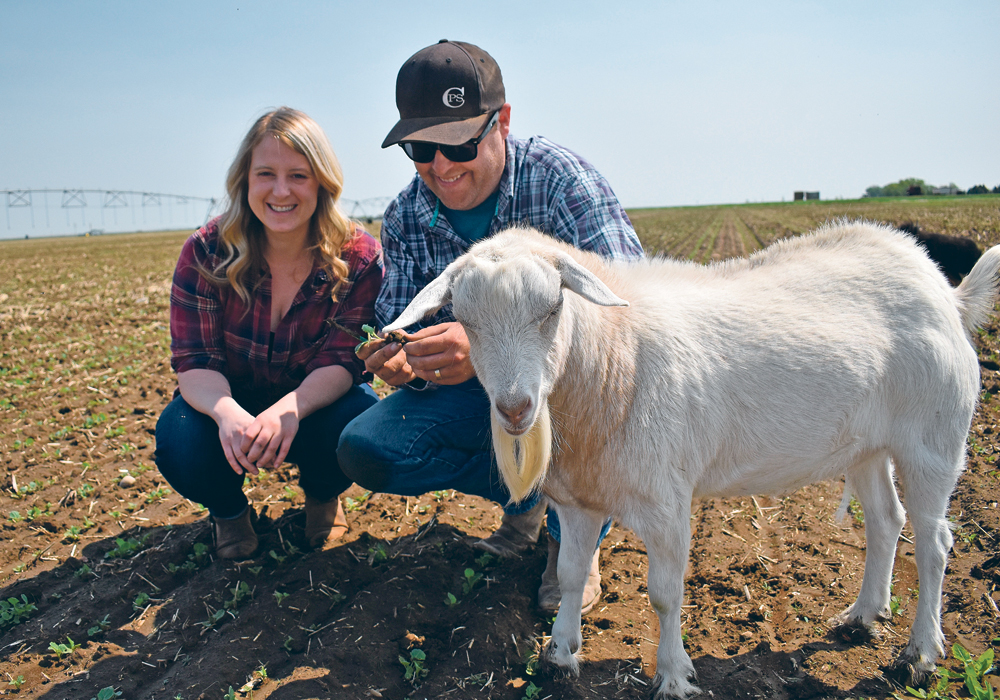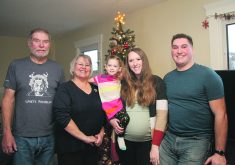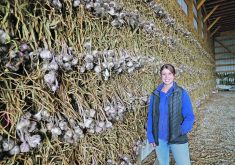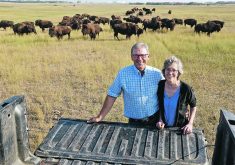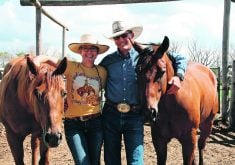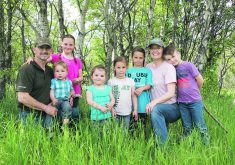On the Farm: Holly White and Kent Sereda sit on agricultural boards and take management and leadership courses
ROLLING HILLS, Alta. — Holly White and Kent Sereda met on a blind date but they’ve had a clear vision about their farm’s future ever since.
They grow seed canola, black beans and navy beans under contract, as well as wheat, corn and tall fescue, on their 2,300-acre farm a few kilometres east of Rolling Hills.
Beyond the work that entails, White recently became a director with the Alberta Canola Producers Commission and Sereda is running for a board position with Farm Management Canada (FCM).
Read Also

Nutritious pork packed with vitamins, essential minerals
Recipes for pork
Married in 2016, White and Sereda signed up for an agricultural excellence conference only a week after their wedding. That was followed by participation in CTEAM, the Canadian Total Excellence in Agricultural Management program, which helps producers develop strategic plans for their farms.
“It actually worked out really well for us. We’d just got married and we were just trying to figure out how everything was working for us, so it kind of forced us to make a plan together,” said White.
“I think it gave Holly confidence for us to go forward, and … have a plan,” Sereda added. “Now we’ve got spreadsheets coming out of our ears.”
White is also studying for a certificate in human resources and Sereda is enrolled in LeaderShift, a leadership course.
Both of them have attended the Canadian Young Farmers Forum and are part of several peer groups of like-minded people in the agricultural industry.
“We’ve kind of done a deep dive on some of this stuff,” said Sereda. “We like to nerd out. Lifelong learning and training is something we’ve always believed in.”
“It’s been a very busy two years and I think it’s been very helpful,” said White about the various programs.
Added Sereda: “It hasn’t quite shown in our bottom line yet but we think we’ve got momentum. I think we’re headed in the right direction and the network Holly has built up, it’s just phenomenal.”
White has a biology degree from the University of Saskatchewan and Sereda graduated in agricultural production through the farm and ranch management course at Olds College.
His great-grandparents and grandparents moved to the region to farm in 1939 or 1940 after moving from southwestern Saskatchewan. His father and uncle later took over and ran a mixed farming and livestock operation until the BSE crisis occurred in 2003.
After that, the farm gradually transitioned to seed and specialty crops. Once Sereda’s father, Ron, bought full ownership in the farm, Ron and his wife, Judy, worked out a transition plan for Kent and they remain involved in the operation.
In those years right after college, Sereda admits farming in the region was a lonely business, with few other young people taking over farms. Now, he and White are encouraged by the many young farmers in their peer group and at farm meetings.
“It’s not old, white guys anymore,” he said. “Now it’s young men and women.
He met White in 2014 while she was working for the County of Newell when friends arranged a blind date that took place in the tractor. She proved she could navigate land locations and dine on sandwiches.
That’s one anecdote they enjoy telling. Another is the result of Kent’s stress over a birthday gift, required during the busy harvest season. Not getting a gift would be unacceptable.
“I didn’t know what to get Holly for her birthday so I got her a very smelly, noisy billy goat, by accident.”
One goat led to another and another, and then a few more, but ultimately they ended up with one fainting goat, Blanche, who roams the yard at will and has a fortunate taste for kochia. Blanche and a pot-bellied pig named Miss Marple are the only livestock on the place, although the couple is planning to start a small cattle herd using grazing land available through the Eastern Irrigation District.
For now, seed canola and beans account for most of the farm’s income, although recent events haven’t helped.
“Before the trade dispute there was a major backlog of seed, a huge stock of seed because of some good production years,” said Sereda.
The same was true of beans so companies cut back on their contracts.
“Our business plan is production contracts and this year there weren’t very many to find.”
White was part of a young leader’s program, which led her to run for the Alberta canola board position.
“I really like the canola board. It’s so forward thinking,” she said of the commission. “Canola is such an interesting crop. It’s so versatile and unique. It’s the most interesting crop we have.”
The canola had emerged in the irrigated field closest to their home as of May 28.
“We have a great water supply and we’re off to a great start, and an early start as well,” Sereda said. “This year if we’re in that time where it’s hot and dry, the corn will do well too.”
Canada’s trade dispute with China over canola is troubling,” said White, “but I like to be optimistic that everything will be resolved by harvest.”
The couple does have expansion in their long-term plan, but given a quarter section in the region recently sold for $1.5 million, the purchase of additional acres will have to be carefully considered.
“Better is better, not bigger is better,” said Sereda, so they plan to take their time.




